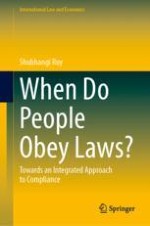2024 | OriginalPaper | Chapter
6. Understanding When Do People Obey Laws Through an Integrated Approach to Compliance: Concluding Remarks
Author : Shubhangi Roy
Published in: When Do People Obey Laws?
Publisher: Springer Nature Switzerland
Activate our intelligent search to find suitable subject content or patents.
Select sections of text to find matching patents with Artificial Intelligence. powered by
Select sections of text to find additional relevant content using AI-assisted search. powered by
